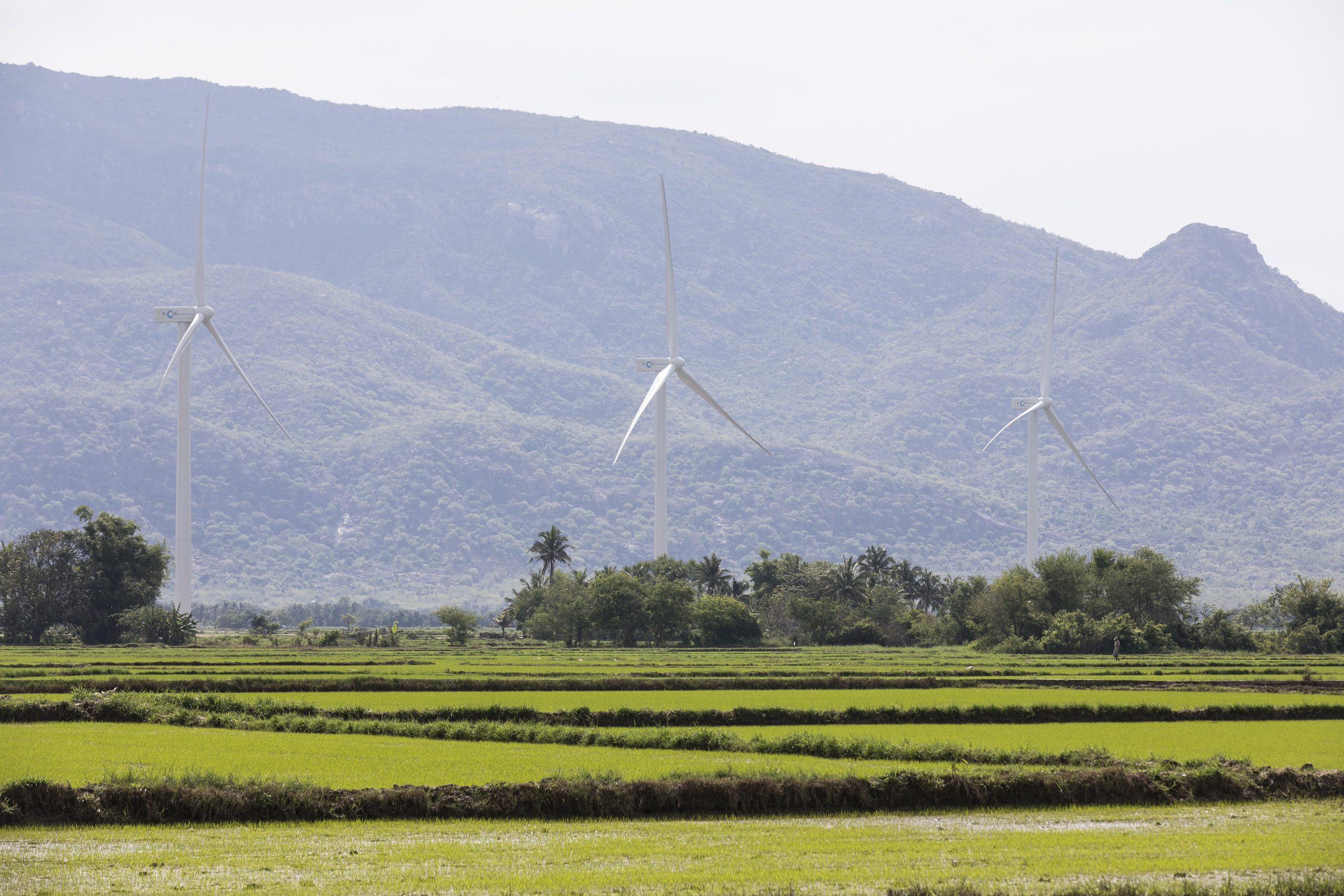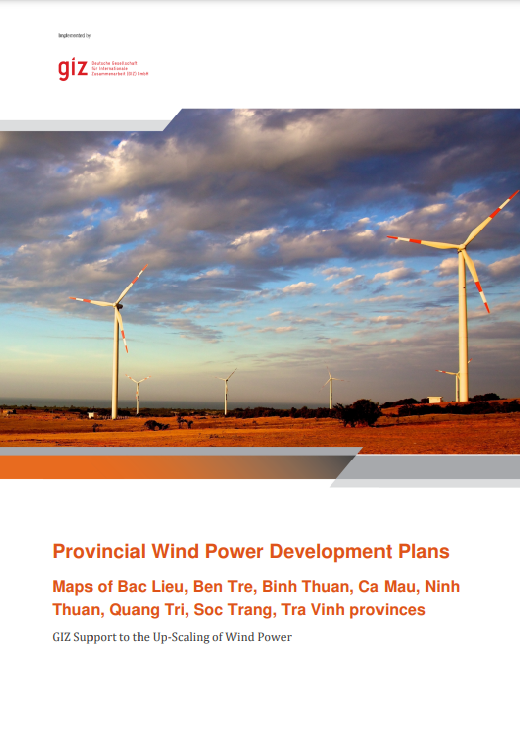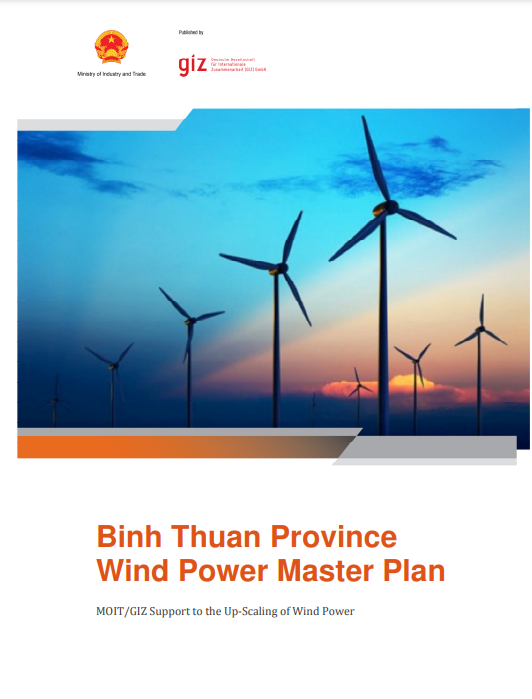
Period
03/2020 - 02/2027


The Support to the Up-Scaling of Wind Power in Viet Nam project aimed to address a number of regulatory and market barriers as well as capacity needs in wind market through technical assistance, in the period 2014-2018. It consisted of three Action Areas, each geared towards the development of the sector.
Action Area 1: Legal and Regulatory Frameworks
MOIT and GIZ worked jointly on improving legal and regulatory frameworks to encourage and facilitate investments in wind power. Among others, partners for these activities included Electricity of Viet Nam (EVN), the Electricity Regulatory Authority of Viet Nam (ERAV), the Institute of Energy (IE), as well as provincial authorities (e.g. DOITs).
Example 1: Proposal for a new Feed-in Tariff
Based on feasibility studies for wind power projects in Viet Nam, GIZ developed a tool to re-calculate a feed-in tariff that was considered economically viable under local conditions. The proposal was subsequently developed for the revision of the tariff and submitted to the Government of Viet Nam together with inputs from other donors. On 10 September 2018, the Prime Minister of Viet Nam approved the revision of the
wind tariff which is increased from 7.8 US cents / kWh to 8.5 US cents / kWh for onshore and 9.8 US cents/kWh for offshore wind power projects.
Example 2: Wind Power Investment Guidelines
To provide clear and transparent instructions for investment in the Vietnamese wind power sector to both public and private stakeholders, GIZ developed Wind Investment Guidelines. A recommendation paper, which was jointly drafted, provided an overview of the opportunities for further improvement of the existing procedures.
Example 3: Levelized Cost of Electricity of Existing Wind Power Projects in Viet Nam
In May and June 2016, GIZ and MOIT worked on a study assessing in detail all capital and operation & maintenance expenditures (CAPEX and OPEX) for wind power projects in Viet Nam. We analysed the real power production of wind farms in Bac Lieu and Binh Thuan provinces and calculated with these and the CAPEX and OPEX the cost for production of a kWh of electricity. In a second step, we derived implications for the revision of the Vietnamese wind power policy. A short version was also available for publication in autumn 2016.
Action Area 2: Capacity Development
Action Area 2 comprised trainings for public institutions as well as Vietnamese project developers, local banks, consulting companies, and specialised engineering firms. Trainings and courses included cash flow modelling for wind farms, financial due diligence, technical aspects of the construction of wind farms, their connection to the transmission grid, and operation & maintenance of wind farms. This action area also rendered direct project development advice to wind projects currently under development.
Example 1: Trainings for Vietnamese Project Developers
GIZ ran more than five week-long trainings per year on project development, targeted at local companies active in the sector. This included all aspects of the development cycle, from early stage development activities such as site assessments, to wind measurements as well as late-stage development aspects such as tendering for technology.
Example 2: Due Diligence Trainings for Local Banks
With more than five trainings per year for local commercial and public banks, GIZ aimed to increase the capacities of credit appraisal departments in analysing, assessing and granting loans to wind power projects. This included the basics of project financing, financial modelling, as well as detailed due diligence trainings.
Example 3: Project Development Clinic
For wind power projects under development, GIZ set-up an advisory platform for any question arising in the development process. If a developer was concerned with the quality of a certain document, needed assistance in interpreting a wind audit, was unsure about the next steps in his project, or required a hint to a suitable consultant for an environmental and social impact assessment, the GIZ Project Clinic stood ready to respond to all requests.
Action Area 3: Technology Cooperation
Activities under this action area aimed to facilitate knowledge transfer between Viet Nam and Germany and stimulate research and innovation on wind power in Viet Nam through research collaborations, student summer schools and private sector partnerships.
Example 1: Vietnam-Germany Joint Research Initiative
The Joint Research Initiative aimed at fostering collaboration on wind power between Vietnamese researchers and their German counterparts. Their joint research was geared towards the deployment of and investment into the wind sector in Viet Nam. Covered topics included innovative turbine designs, environmental impacts assessment and the economic viability of wind power in Viet Nam.
Example 2: Wind Power Summer School
MOIT and GIZ worked closely with German and Vietnamese universities to organise a two-week Wind Power Summer School in September 2016. Students coming from the two countries with backgrounds in engineering, economics or finance had the opportunity to learn from experts and companies about wind technology, project development and financing, and wind farms operation and maintenance. The summer school was rounded up by a job fair.
Example 3: Wind Measurement Campaign
GIZ measured wind speeds at 60m and 80m height at 10 sites across 8 provinces of Viet Nam, in an effort to validate and improve the accuracy of available meteorological surface data, as well as to identify potential sites for the development of projects. The data was published on the World Bank Open Energy Data Platform and had been used in several studies implemented by stakeholders of the development sector.
€6,900,000
Federal Ministry of Economic Cooperation and Development (BMZ) German Climate Technology Initiative (DKTI)
Political Partner: Vietnam Ministry of Industry and Trade (MOIT)
Implementing Agency: Electricity and Renewable Energy Authority (EREA)
WIND

WIND
WIND
WIND
WIND
WIND

WIND
WIND

WIND
€6,900,000
Federal Ministry of Economic Cooperation and Development (BMZ) German Climate Technology Initiative (DKTI)
Political Partner: Vietnam Ministry of Industry and Trade (MOIT)
Implementing Agency: Electricity and Renewable Energy Authority (EREA)
The Support to the Up-Scaling of Wind Power in Viet Nam project aimed to address a number of regulatory and market barriers as well as capacity needs in wind market through technical assistance, in the period 2014-2018. It consisted of three Action Areas, each geared towards the development of the sector.
Action Area 1: Legal and Regulatory Frameworks
MOIT and GIZ worked jointly on improving legal and regulatory frameworks to encourage and facilitate investments in wind power. Among others, partners for these activities included Electricity of Viet Nam (EVN), the Electricity Regulatory Authority of Viet Nam (ERAV), the Institute of Energy (IE), as well as provincial authorities (e.g. DOITs).
Example 1: Proposal for a new Feed-in Tariff
Based on feasibility studies for wind power projects in Viet Nam, GIZ developed a tool to re-calculate a feed-in tariff that was considered economically viable under local conditions. The proposal was subsequently developed for the revision of the tariff and submitted to the Government of Viet Nam together with inputs from other donors. On 10 September 2018, the Prime Minister of Viet Nam approved the revision of the
wind tariff which is increased from 7.8 US cents / kWh to 8.5 US cents / kWh for onshore and 9.8 US cents/kWh for offshore wind power projects.
Example 2: Wind Power Investment Guidelines
To provide clear and transparent instructions for investment in the Vietnamese wind power sector to both public and private stakeholders, GIZ developed Wind Investment Guidelines. A recommendation paper, which was jointly drafted, provided an overview of the opportunities for further improvement of the existing procedures.
Example 3: Levelized Cost of Electricity of Existing Wind Power Projects in Viet Nam
In May and June 2016, GIZ and MOIT worked on a study assessing in detail all capital and operation & maintenance expenditures (CAPEX and OPEX) for wind power projects in Viet Nam. We analysed the real power production of wind farms in Bac Lieu and Binh Thuan provinces and calculated with these and the CAPEX and OPEX the cost for production of a kWh of electricity. In a second step, we derived implications for the revision of the Vietnamese wind power policy. A short version was also available for publication in autumn 2016.
Action Area 2: Capacity Development
Action Area 2 comprised trainings for public institutions as well as Vietnamese project developers, local banks, consulting companies, and specialised engineering firms. Trainings and courses included cash flow modelling for wind farms, financial due diligence, technical aspects of the construction of wind farms, their connection to the transmission grid, and operation & maintenance of wind farms. This action area also rendered direct project development advice to wind projects currently under development.
Example 1: Trainings for Vietnamese Project Developers
GIZ ran more than five week-long trainings per year on project development, targeted at local companies active in the sector. This included all aspects of the development cycle, from early stage development activities such as site assessments, to wind measurements as well as late-stage development aspects such as tendering for technology.
Example 2: Due Diligence Trainings for Local Banks
With more than five trainings per year for local commercial and public banks, GIZ aimed to increase the capacities of credit appraisal departments in analysing, assessing and granting loans to wind power projects. This included the basics of project financing, financial modelling, as well as detailed due diligence trainings.
Example 3: Project Development Clinic
For wind power projects under development, GIZ set-up an advisory platform for any question arising in the development process. If a developer was concerned with the quality of a certain document, needed assistance in interpreting a wind audit, was unsure about the next steps in his project, or required a hint to a suitable consultant for an environmental and social impact assessment, the GIZ Project Clinic stood ready to respond to all requests.
Action Area 3: Technology Cooperation
Activities under this action area aimed to facilitate knowledge transfer between Viet Nam and Germany and stimulate research and innovation on wind power in Viet Nam through research collaborations, student summer schools and private sector partnerships.
Example 1: Vietnam-Germany Joint Research Initiative
The Joint Research Initiative aimed at fostering collaboration on wind power between Vietnamese researchers and their German counterparts. Their joint research was geared towards the deployment of and investment into the wind sector in Viet Nam. Covered topics included innovative turbine designs, environmental impacts assessment and the economic viability of wind power in Viet Nam.
Example 2: Wind Power Summer School
MOIT and GIZ worked closely with German and Vietnamese universities to organise a two-week Wind Power Summer School in September 2016. Students coming from the two countries with backgrounds in engineering, economics or finance had the opportunity to learn from experts and companies about wind technology, project development and financing, and wind farms operation and maintenance. The summer school was rounded up by a job fair.
Example 3: Wind Measurement Campaign
GIZ measured wind speeds at 60m and 80m height at 10 sites across 8 provinces of Viet Nam, in an effort to validate and improve the accuracy of available meteorological surface data, as well as to identify potential sites for the development of projects. The data was published on the World Bank Open Energy Data Platform and had been used in several studies implemented by stakeholders of the development sector.
WIND

WIND
WIND

















